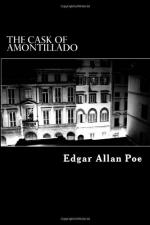|
This section contains 3,089 words (approx. 11 pages at 300 words per page) |

|
SOURCE: "'The Cask of Amontillado': A Masquerade of Motive and Identity," in Studies in Short Fiction, Vol. IV, No. 2, Winter, 1967, pp. 119-26.
In the following essay, Gargano considers the symbolic value of Montresor and Fortunato, arguing "'The Cask of Amontillado' is a work of art (which means it embodies a serious comment on the human condition) and not just an ingenious Gothic exercise. "
"The Cask of Amontillado," one of Edgar Allan Poe's richest aesthetic achievements, certainly deserves more searching analysis than it has received. To be sure, critics and anthologists have almost unanimously expressed admiration for the tale;1 still, they have rarely attempted to find in it a consistently developed and important theme. Indeed, most criticism of the story has the definitive ring that one associates with comments on closed issues. Arthur Hobson Quinn, for example, pronounces Poe's little masterpiece "a powerful tale of revenge in which the...
|
This section contains 3,089 words (approx. 11 pages at 300 words per page) |

|


